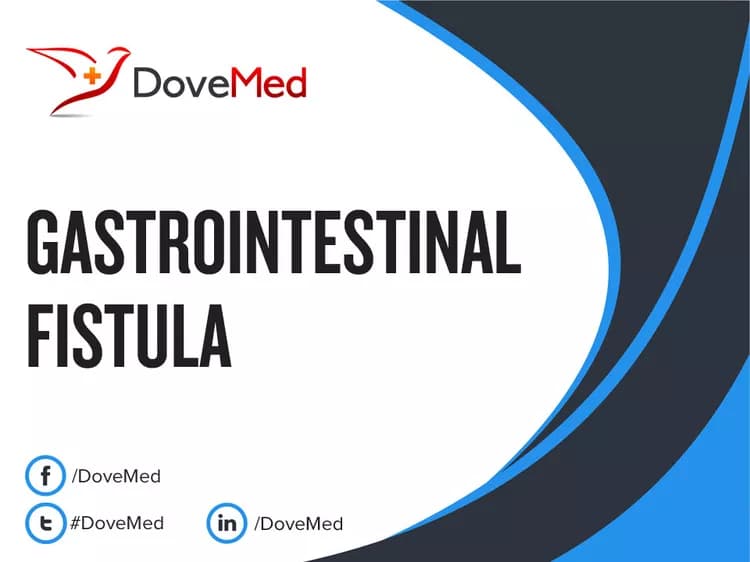What are the other Names for this Condition? (Also known as/Synonyms)
- Enterocutaneous Fistula (ECF)
- Entero-Enteral Fistula
- GI Fistula
What is Gastrointestinal Fistula? (Definition/Background Information)
- A Gastrointestinal Fistula is an abnormal opening in the gut (stomach or intestines) that results in an abnormal connection between the gut and other organs. The condition causes the intestinal or stomach contents to ‘leak out’
- Gastrointestinal Fistula can be of the following types:
- Entero-Enteral Fistula, which is an abnormal connection between two portions of the intestine
- Enterocutaneous Fistula (ECF), which is an abnormal connection between the gut and skin
- There can also be an abnormal connection between the gut and other organs such as the bladder, vagina, and anus
- Individuals with Crohn’s disease, ulcerative colitis, and those who have had bowel surgery, are reported to be at an increased risk of developing GI Fistula. A few causes for the condition include birth defects, bowel cancer, and inflammatory bowel diseases
- The main symptoms associated with the condition include abdominal pain, fever, diarrhea, dehydration, and malabsorption. Dehydration, skin infection, and malnutrition are some potential complications that may arise due to a Gastrointestinal Fistula
- Gastrointestinal Fistula may be accurately diagnosed through imaging studies, such as abdominal scans, barium swallow or barium enema, fistulogram, and blood tests
- An attempt is typically made to treat the disorder with antibiotics, intravenous nutrition and steroids, before resorting to surgical repair. The prognosis of Gastrointestinal Fistula is considered to be good, with early and appropriate treatment
- Diagnosing and treating the underlying cause for the development of Gastrointestinal Fistula is considered the best way to prevent the condition
Who gets Gastrointestinal Fistula? (Age and Sex Distribution)
- Gastrointestinal Fistula can potentially occur in individuals of any age or gender
- There is no specific racial or ethnic predilection reported for its occurrence
What are the Risk Factors for Gastrointestinal Fistula? (Predisposing Factors)
Risk factors associated with Gastrointestinal Fistula may include:
- Chronic inflammatory diseases of the intestine such as Crohn’s disease and ulcerative colitis
- Poor diet
- Exposure to radiation
- Trauma
- Bowel surgery
It is important to note that having a risk factor does not mean that one will get the condition. A risk factor increases ones chances of getting a condition compared to an individual without the risk factors. Some risk factors are more important than others.
Also, not having a risk factor does not mean that an individual will not get the condition. It is always important to discuss the effect of risk factors with your healthcare provider.
What are the Causes of Gastrointestinal Fistula? (Etiology)
Some possible causes of Gastrointestinal Fistula may include:
- Birth defects
- Bowel surgery
- Inflammatory bowels diseases such as Crohn’s disease and ulcerative colitis
- Cancer
- Radiation exposure
- Trauma
- Obstruction of the intestinal tract
What are the Signs and Symptoms of Gastrointestinal Fistula?
Some common signs and symptoms of Gastrointestinal Fistula may include:
- Abdominal pain
- Fever
- Malabsorption
- Leakage of GI contents that reach the skin (such as in Enterocutaneous Fistula)
- Diarrhea
- Dehydration
There may not be any associated symptoms for Entero-Enteral Fistulas in some cases.
How is Gastrointestinal Fistula Diagnosed?
For an accurate diagnosis of Gastrointestinal Fistula, information from the following tests and exams may be necessary:
- Complete evaluation of medical history, along with a thorough physical exam
- Blood tests to check for electrolyte levels or serum albumin levels
- Imaging studies such as ultrasound, CT scan or MRI scan
- Barium swallow (to identify a gastrointestinal fistula)
- Barium enema (to identify a fistula involving the colon)
- Upper and lower gastrointestinal endoscopy
- Fistulogram: A process of injecting a contrast dye into the opening of an Enterocutaneous Fistula, followed by an X-ray scan
Many clinical conditions may have similar signs and symptoms. Your healthcare provider may perform additional tests to rule out other clinical conditions to arrive at a definitive diagnosis.
What are the possible Complications of Gastrointestinal Fistula?
Gastrointestinal Fistulas may cause the following complications:
- Severe dehydration
- Skin infection
- Severe malnutrition
- Perforation of the stomach or intestine
- Septicemia (infection spreading into blood)
How is Gastrointestinal Fistula Treated?
The treatment of a Gastrointestinal Fistula mainly depends on its cause and severity. The following treatments may be considered before recommending surgical repair of the fistula:
- Antibiotics
- Intravenous fluid and nutrition
- Steroids to treat underlying disease such as ulcerative colitis and Crohn’s disease
- Skin creams to protect from infection: In case of Enterocutaneous Fistula, the leaked bowel contents can cause infection of the skin. antibiotic creams applied around the opening of the fistula can help treat and prevent skin infections
If the fistula does not heal on its own within a few weeks, a surgical intervention may be necessary. Under such conditions, the treatment options include:
- Opening and draining of the fistula
- Removing the fistula and a part of the intestine
How can Gastrointestinal Fistula be Prevented?
Gastrointestinal Fistula can be prevented by effectively treating underlying conditions responsible for the formation of the fistula.
What is the Prognosis of Gastrointestinal Fistula? (Outcomes/Resolutions)
- The prognosis of Gastrointestinal Fistula is considered to be good, with early and effective treatment
- A few cases may resolve spontaneously in the absence of any specific treatment
Additional and Relevant Useful Information for Gastrointestinal Fistula:
- Anal fistula repair is a procedure that involves the surgical opening of the anal fistula, which helps in the healing process of the fistula
The following article link will help you understand anal fistula repair procedure:
https://www.dovemed.com/common-procedures/procedures-surgical/anal-fistula-repair/
Related Articles
Test Your Knowledge
Asked by users
Related Centers
Related Specialties
Related Physicians
Related Procedures
Related Resources
Join DoveHubs
and connect with fellow professionals


0 Comments
Please log in to post a comment.